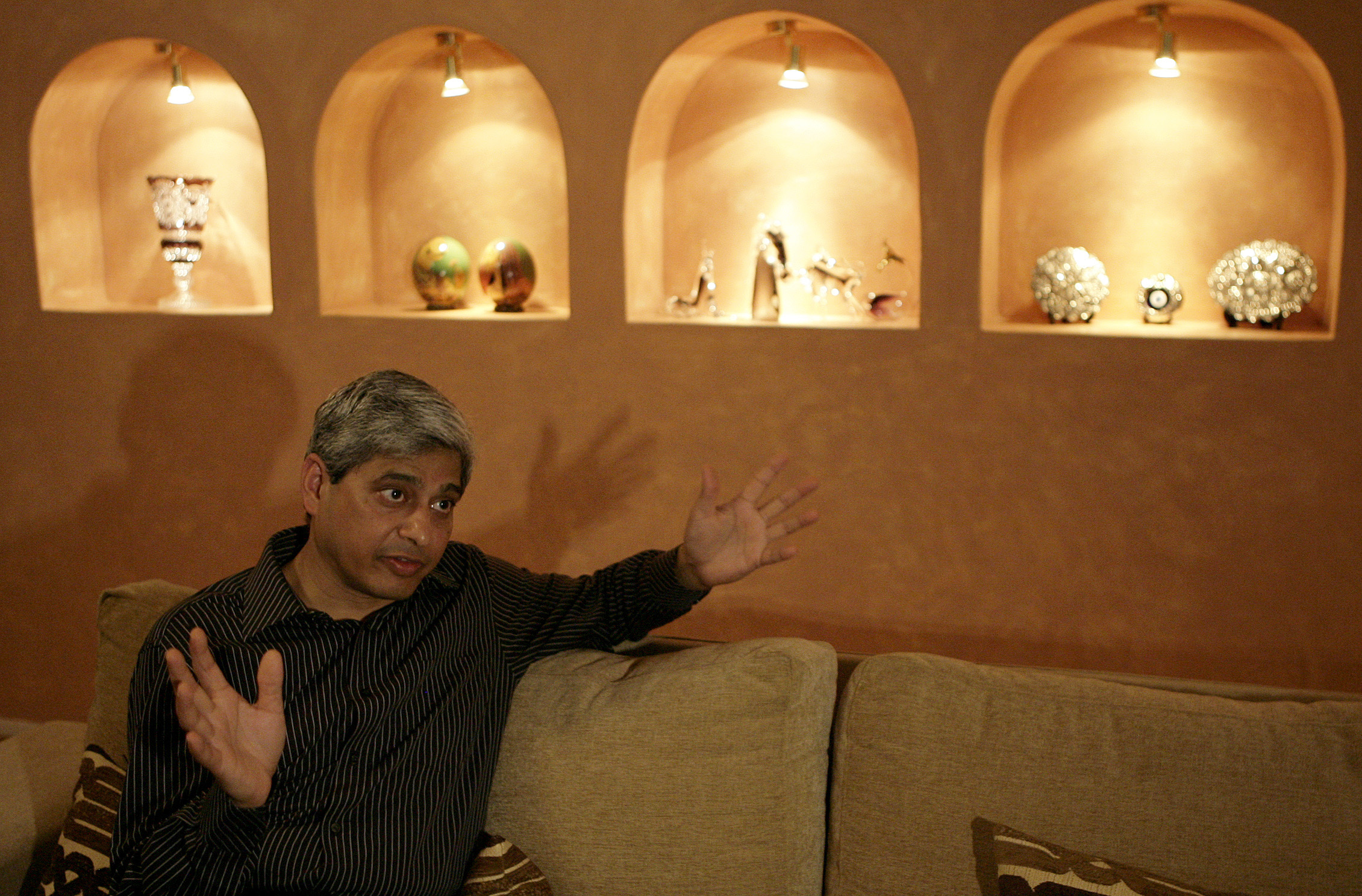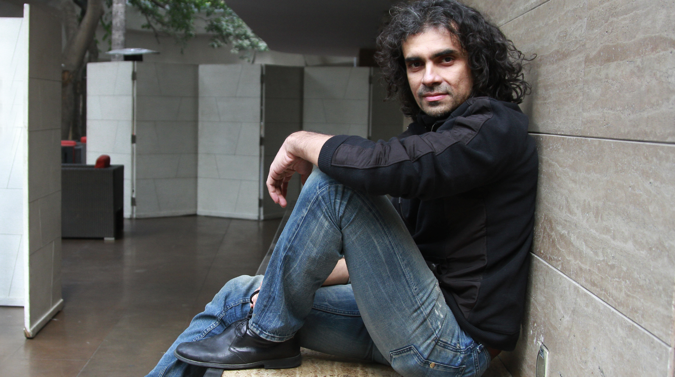Indian Spokesman’s books inspired by Russian authors

Vikas Swarup.
ReutersYou started writing quite late. What happened that you felt the desire to write a novel?
You are absolutely right. I came to writing very late in my life. I always thought of myself as a reader. Even as young boy growing up in a small Indian town called Allahabad my best pastime was reading books. I read everything and anything I could lay my hands upon whether it was Albert Camus, Leo Tolstoy or (Fyodor) Dostoevsky. I never thought that I could be myself a writer. It was when I was posted in London (between 2000 and 2003) that the thought of becoming a writer came to my head.
There were two reasons for that. One, I was in London. London is such a big hub for the world of English language publishing. Every week some new books are being launched, some new writers are being born into the world.
The second thing was that some of my friends in the service started writing fiction. You know, people like Navtej Sarna. And they acted like the inspiration for me.
I said: “Well, they are my friends. They are writing novels. Can I also write a novel?” So it is really started as a secret project to prove something to myself, as a challenge to myself: “Ok. You are Vikas Swarup, the diplomat. Can you be Vikas Swarup, the writer? Do you have the story?” And believe it or not, but I wrote my debut novel “Q&A” just in two months, the last two months of my posting.
I really look at myself as a lucky writer, because there are many writers a million times more talented than me, but they are not being published. I got accepted with my first novel.
Did you develop your style of writing by yourself or do you have some idols in literature who helped you to do this?
My idols are the great writers that I had read from the age of 6 to the age of 40. I do not have any one particular writer. I think it was that process of reading that made me able to distinguish between what is bad writing and what is good writing.
You wrote your first novel only in two months. Could you tell how the plot of this book was born in your mind?
When I was posted in London this quiz show “Who wants to be a millionaire” became very popular. And in India, the Hindi version of this show became a rage, anchored by Amitabh Bachchan, the great Bollywood actor. At 9.00 pm when Amitabh Bachchan would come on TV screens, people would become positively antisocial. When I watched this show and saw its huge popularity, I realized that they had done something different in the sense that they have changed the definition of the quiz show.
When I was growing up, I was also a very active quizzer. I used to appear in quiz competitions in schools and colleges. But in the new format of “Who wants to be a millionaire” it is not about your knowledge. It is about whether you know the value of money, because every question comes with the huge cash prize; 5000 rupees, 10 000 rupees, 50 000 rupees, 100 000 rupees, like that. But if you are sitting on one million rupees and they ask you a question and you are 99 percent sure about the answer, but not 100 percent, what you would say is “No, no I will take the money and go”. I thought they changed the very definition of quizzing. So I thought it would be interesting to set a story based around such a quiz show but with the context of a man who has never had formal education, who goes for a quiz not to win money but with some other purpose. And what I wanted to show is that the best teacher in the world is not school, the best teacher is life. And those who learn from the school of life, they have certain experiences that no amount of books can give.
Did you expect that the movie “Slumdog millionaire” which is based on your book would have such a big success?
No. Forget whether the movie will be successful, I even did not know if my book will be published. Because so many writers write novels and they are not being published. I was asked: “When you are writing the novel could you visualize it as a film?” I said: “I could not even visualize it as a book”. I was first-time writer. I have never written before. I did not know a single publisher, I did not know a single agent. So it was not as if I have a godfather or secret connections.
First of all getting published itself was a huge surprise for me. But the biggest surprise was the film, because I wrote this book in 2003, it was published in 2005, and the film deal came in 2004. One year before the book was even published. I got a call from the film agency, saying that they wanted to make film based on my book. I said: “How do you know I have written a book? It is not published yet.” They said that my publisher offered it and they loved it. I signed the contract. And of course nobody thought that the film would be such a big hit.
Two years ago you published a new novel “Accidental Apprentice”. And it was reported that Indian producer Sriram Raghavan was going to make movie based on it. Do you expect the new success?
I have two deals now. I have a Hollywood deal with BBC and a Bollywood deal with Sriram Raghavan. I hope both these films will be made. Sriram is taking a lot of time. He is not happy with the screenplay. I think it pointless to say how successful it would be, but everyone who would has read this novel says it has a very cinematic plot. Sriram Raghavan is looking also at casting. He is a director I really admire, whose work I like.
Your first two books “Q&A” and “Six suspects” were translated in Russian and published in Russia. When your new novel will reach Russian audience?
Till now it has not been translated. I am not sure why, but may be after this interview it will be done.
What are your future plans? Are you working on any new novel?
No, at the job of spokesperson, there is no time for writing anything. There is no free time at all. I am busy from Monday to Monday. This is 24*7 job, because the news cycle never stops. Journalists keep calling me on Saturday, on Sunday, at 1 o’clock at night. They are following stories all the time and the story doesn’t want to wait. Right now I am totally engaged with my job. It is high pressure. But eventually I will go on a posting. All three of my books were written when I was posted abroad; the first one in London, the second one in South Africa, the third one in Japan. So, hopefully once I am out in the field, the creating will start.
In your books “Q&A” and “Accidental Apprentice” the main heroes Ram and Sapna have to go through the number of tests. For Ram it was quiz questions, for Sapna the tests of billionaire. Is this important for you to show that to achieve the success in life you should to meet some challenges, gain experience?
I think so. In today’s world what is happening is that people think there are shortcuts. You appear in a TV show, you become instantly successful. But I personally believed that the true success comes only through hard work, not from shortcuts. And the second thing is that I have to be true to my characters. If my character is a street urchin who does not go to school, he cannot graduate from Moscow University in chapter 2. His life will be in places like bars, working as a waiter somewhere. This is how poor people in India face life. Similarly, in “Accidental Apprentice,” the life story of a young low-middle class person. She is intelligent, committed, but she does not have the economic means to the university. So she is asked to work as a salesperson. She has certain life experiences which, I think, are accurate in terms of the class of society that I am trying to show. She has a younger sister who is very beautiful, who wants to be a film star but it is difficult to achieve those dreams.
You have mentioned that in your childhood you have read Russian authors like Dostoevsky, Tolstoy… Who is your favorite one?
Russian authors are the rage. ‘War and Peace’, I am sorry, I could not read. But I’ve read “Doctor Zhivago”, “Crime and Punishment”, Leo Tolstoy’s short stories. What was it? The life of Ivan Denisovich, the farmer who wants to get so much land, but at the end of the day he dies and says the only land you need is six feet for your coffin (“Gooseberries” by Anton Chekhov – Ed.). I was much influenced because Russian writers deal with real life problems. They are not mythical fantasy. So I was attracted to those kinds of writers.
You are talking about classical Russian literature. Are you familiar with modern Russian authors?
No, I have not read them yet.
Do you have plans to create Russian character in your future novels? And how could you imagine him or her?
You see, after the end of the Cold War, the fiction writing world has changed. All the novels in the past that I have read were about Moscow, Nevsky prospect, KGB, CIA and so on. Once the Cold War ended, those kinds of novels went out of circulation. Now novels are more about ISIS, threats of terrorism and things like that. Recently I came back from Moscow, where I was with our Prime-Minister. And the city is fantastic with all these multi-colour domes and huge boulevards. So certainly, Moscow is a very cinematic city. It has a lot of history, a lot of culture. Russian people I think are the most literate people in the world who love novels, who love reading. Everywhere I saw in Moscow people were reading newspapers and books. The Russian reader is one of the most committed readers in the world. But I do not know the Russian hero because first I have to understand the DNA of Russians. I have never been posted in Russia. I have Russians friends, but I do not drink vodka. I need to know Russians and check how vodka tastes. But there is one minor character in my first novel, named Mikhailov, who won the quiz show.
This year you complete 30 years as a diplomat. Does your writing help you in your diplomatic work?
Yes, absolutely. Especially after “Slumdog Millionaire.” When I was posted in Osaka as Consul-General, I was supposed to meet the governor of province and the mayor of the city according to protocol. I was told it would take from 3 weeks to 3 month to arrange such meetings. But the mayor saw me after seven days of my arrival. What’s happened? He said: “Oh, the author of “Slumdog Millionaire is in town!”
It was the year when that movie won many Oscars. Many roads are now open to me because of the success of my novel. Many universities invite me for lectures. I use these opportunities to speak not about “Slumdog Millionaire”, but about India.
It helps me to enlarge my area of work as a diplomat.
All rights reserved by Rossiyskaya Gazeta.
Subscribe
to our newsletter!
Get the week's best stories straight to your inbox
